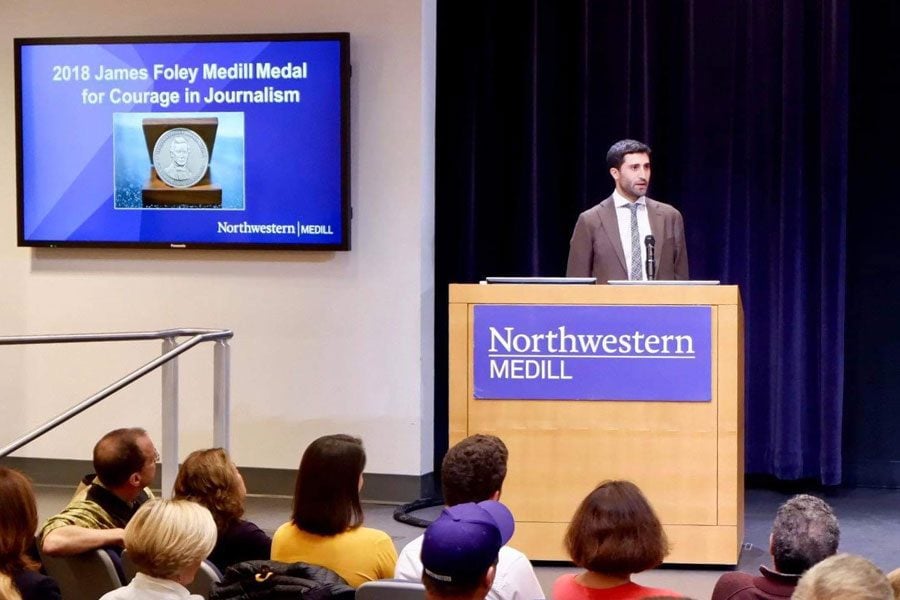Max Bearak, recipient of James Foley Medill Medal for Courage in Journalism, talks courage, importance of fair representation
Zinya Salfiti/The Daily Northwestern
Max Bearak. The reporter was the recent recipient of the 2018 James Foley Medill Medal for Courage in Journalism
October 20, 2019
Max Bearak, chief of the Washington Post’s Nairobi bureau and recipient of the 2018 James Foley Medill Medal for Courage in Journalism, said his courage is a reflection of the people around him who face more difficult lives with greater courage than his own.
“I’m surrounded by people — millions of people, in fact — who are drawing on much deeper wells of courage than my own,” Bearak said. “They’re living without the most basic services from their government, and without the possibility of government if they’re wrong… When I think of my own well of courage, I think about how I’ve relied on others to fill it up.”
Bearak received the award at the Friday event in the McCormick Foundation Center Forum. Established in 2003, the medal is given by Medill to an individual or team at a U.S-based journalism outlet that displayed courage in their reporting of a story or a series of stories.
Bearak was awarded the Medal for his 2018 reporting in sub-Saharan Africa, during which he covered the Ebola crisis in the Congo, Boko Haram defectors and demonstrations after the Zimbabwean general elections. Bearak was chosen as the recipient following a unanimous vote from the judges panel, according to a June press release.
“The range of Bearak’s reporting in Africa I think is a complete portfolio of courage, covering a geographic beat in an incredibly rich way,” Medill Prof. Donna Leff, one of the judges for the award, said in a June press release. “So many of the stories from this part of the world are often written as one-offs or not heard at all. Bearak was able to write about the Ebola outbreak as it was happening while retaining a rich cultural and historical context.”
During his speech, Bearak discussed the people he relied on to provide him with courage, ranging from his parents who helped him through encouragement to The Washington Post, which gave him the job of Nairobi bureau chief at 27. Bearak also praised the courage of the people he worked with, including his translators and guides, and discussed the altruism of a Nigerian governor who believed in the possibility of rehabilitation for children indoctrinated by Boko Haram, and established a deradicalization program for members of the terrorist organization.
Bearak also said although his reporting focuses on African countries facing turmoil, unrest does not characterize the whole of Africa. Conceptions of the country as a uniquely troubled place can be viewed as a subjugation similar to colonialism, he said. In his reporting, Bearak said he is aware of preexisting prejudices and aims to challenge them by representing those he covers as people instead of victims.
“The voices that portray Africans universally as victims sometimes seem louder than those that view them as people,” Bearak said. “The far greater courage comes from an instinct … to go forth as a journalist not just to bear witness, but to ask tough questions, of your sources and of your readers, and to challenge their prevailing misconceptions.”
Medill’s director of alumni engagement Belinda Clarke, who helped organize the event, told the Daily that she thought Bearak’s presentation was fantastic, and she appreciates his humility and his skills as a reporter.
“He mentioned, but didn’t talk much about it, he’s grown up all over the world — both his parents were global journalists,” Clarke said. “That makes him very comfortable in places most journalists don’t want to be. And that makes him really good at what he does.”
Email: wilsonchapman2021@u.northwestern.edu
Twitter: @wilsonchapman6


